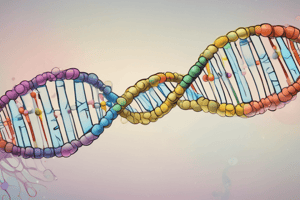Podcast
Questions and Answers
In a DNA double helix, an adenine of one strand always pairs with a(n) _____ of the complementary strand, and a guanine of one strand always pairs with a(n) _____ of the complementary strand.
In a DNA double helix, an adenine of one strand always pairs with a(n) _____ of the complementary strand, and a guanine of one strand always pairs with a(n) _____ of the complementary strand.
thymine...cytosine
What does each new DNA double helix consist of after DNA replication?
What does each new DNA double helix consist of after DNA replication?
one old DNA strand and one new DNA strand
What catalyzes the first step in the replication of DNA?
What catalyzes the first step in the replication of DNA?
helicase
What does the action of helicase create?
What does the action of helicase create?
Why is the new DNA strand complementary to the 3' to 5' strands assembled in short segments?
Why is the new DNA strand complementary to the 3' to 5' strands assembled in short segments?
What begins the synthesis of a new strand?
What begins the synthesis of a new strand?
An old DNA strand is used as a _____ for the assembly of a new DNA strand.
An old DNA strand is used as a _____ for the assembly of a new DNA strand.
What joins short segments of newly synthesized DNA into a continuous strand?
What joins short segments of newly synthesized DNA into a continuous strand?
Which enzyme is responsible for catalyzing the formation of an RNA primer?
Which enzyme is responsible for catalyzing the formation of an RNA primer?
What are Okazaki fragments?
What are Okazaki fragments?
What is the name of the new DNA strand that grows continuously in the 5' to 3' direction?
What is the name of the new DNA strand that grows continuously in the 5' to 3' direction?
What is an open section of DNA called, where a DNA polymerase can replicate DNA?
What is an open section of DNA called, where a DNA polymerase can replicate DNA?
What is the enzyme that can replicate DNA called?
What is the enzyme that can replicate DNA called?
What do the new DNAs produced after replication, called _____, have in common?
What do the new DNAs produced after replication, called _____, have in common?
Flashcards are hidden until you start studying
Study Notes
DNA Pairing and Structure
- Adenine pairs with thymine, while guanine pairs with cytosine in DNA double helices.
- Each new DNA double helix contains one old strand and one newly synthesized strand after replication.
DNA Replication Process
- Helicase is the enzyme that initiates DNA replication by unwinding the double helix.
- This unwinding creates replication forks and bubbles in the DNA structure.
Synthesis Directionality
- New DNA strands are synthesized in the 5' to 3' direction due to the properties of DNA polymerase.
- To replicate the 3' to 5' strand, short segments are produced, known as Okazaki fragments.
Initiation of DNA Synthesis
- Synthesis of a new DNA strand starts with an RNA primer, which is complementary to the existing DNA strand.
- Primase enzyme is responsible for catalyzing the formation of this RNA primer.
Assembly and Joining
- An old DNA strand serves as a template for the new strand assembly during replication.
- Short DNA segments are connected into a continuous strand by the enzyme ligase.
Characteristics of DNA Strands
- The strand growing continuously in the 5' to 3' direction is referred to as the leading strand.
- The segments on the lagging strand are called Okazaki fragments, necessary for replication efficiency.
Key Enzymes in DNA Replication
- DNA polymerase is the enzyme responsible for replicating DNA.
- The replication fork is the active site where DNA polymerase can replicate the exposed DNA.
Outcome of DNA Replication
- Following replication, the resulting DNA molecules, known as daughter DNA, are identical to each other.
Studying That Suits You
Use AI to generate personalized quizzes and flashcards to suit your learning preferences.




